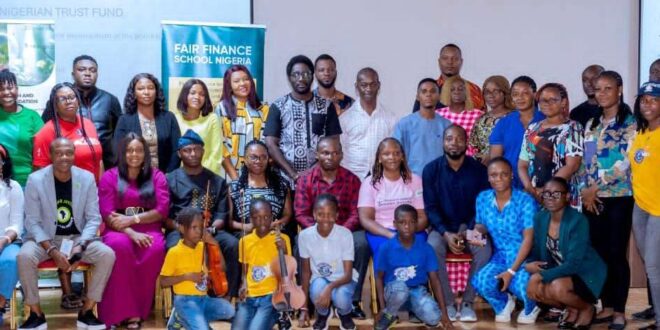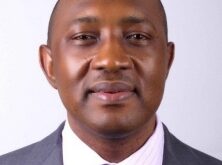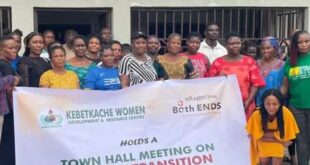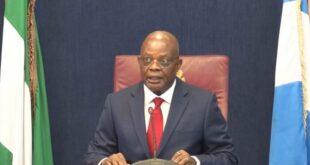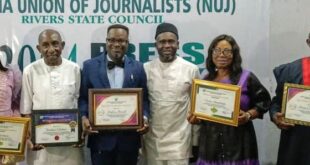By Kelechi Nwaucha
Non-governmental organization, Quest for Growth and Development Foundation, has organized a two-day training on climate financing for civil society groups, climate activists, climate actors and social activists in Nigeria.
The training, which was a product of Fair Finance School Nigeria, with support from Fair Finance Southern Africa, sought to build the capacity of CSOs and other participants on the issue of fair financing for climate action towards ensuring climate justice.
Smith Nwokocha, coordinator of Quest for Growth and Development Foundation, said the essence of the fair finance school in Nigeria, with support from Southern Africa Fair Finance Coalition, “is to empower CSOs, climate activists, climate actors, social activists and the likes to be able to deal with financial issues.
“Because once they hear of finance, they feel its numbers, and they’re scared of it and try to shy away from it. So we had this workshop, which is of course a school, and we’ve been able to empower a lot of CSOs, who are present for this training. What we do is to encourage them to get better insights and also learn from it. And then they can also start their own school and train people, like a step-down training for the CSOs.”
Our reporter gathered that about 50 CSOs were represented at the training. Mr Nwokocha said “we have participants from Rivers State, Bayelsa, Delta State, Abuja, Lagos, and then Enugu. So basically the geo-political zones of Nigeria are being represented. They are all here, well represented. So that they have this knowledge and they are able to set up something of their own.
“Again, we are also working on the part of public finance, so that they can also go to some of the financial institutions, as well as policy makers, to ensure that we have a better way of assessing climate finance. I hope that at the end of the day, they will have a proper understanding of financial issues and activities in an activist way. We want to certify finance, you know, climate finance, so that it works a little bit better in this part of the world.
“Some of the advantages of this for CSOs is that it’s the first time we are doing this training in Nigeria, and it’s done across different parts of the world. So we have Fair Finance South Africa, Fair Finance Ghana, Fair Finance India, and Fair Finance Nigeria.”
He noted that the Global North dominates the climate finance space, but expressed belief that “with this kind of school and conscientization, information and advocacy, CSOs can now give a voice and a space for the Global South.”
Programs manager at We the People, Grace Apollos, a participant, said “the implications of climate change, especially in the Niger Delta, is very complex. What we always say is that although we are the least contributors to the climate crisis, we bear the biggest brunt because of how we appear on the equator.
“So the issue of climate finance is very important at a time like this when the people in the Niger Delta are suffering the impact of climate change. We can either, or simultaneously, mitigate and adapt to climate change,” she said.
Apollos however noted that “It is only rational that people at the front lines of the climate crisis are supported to live with the impact of climate change and that is what adaptation means in this context.
“There is the issue of fair finance and climate change. So for this, it’s really pertinent to mention that it will be inhuman so to say for developed countries to give us money in form of loans to tackle the issues of climate change that we did not contribute to and that is where the fair finance is coming from.
“If you’re giving us money to adapt to floods to adapt to drought, those are consequences of climate change, and so it should not be a loan it should be instant reparation and composition for the emissions that you have caused,” she said.
Resource person at the event, Mr Patrick Uduma, speaking on ‘The Positionality of Finance,’ pointed out the need for transparency and accountability in the use of climate finance, and for users of such funds to hold themselves accountable.
He called for discipline in the use of public or climate funds, while urging the monitoring and supervision of beneficiaries such funds, and the establishment of a consequence management system to ensure accountability and discipline.
Legal practitioner and resource person, Blessing Udofa Esq, who spoke on the human rights perspective to climate change and its financing, said the issue of climate is one that requires “continuous discussion,” adding “If we’re ever going to have a sustainable world, a world in which we have what is left (that is good), we have to keep for even our children, and ourselves. I think it’s important that we keep up the conversation and expand on advocacy.”
She said “Chapter 4 of the Constitution of the Federal Republic of Nigeria listed out our different rights, from a right to life, right to association, right to dignity, especially Section 20 of the 1999 Constitution that talks about the government, our expectation, our right to a clean environment.
“But first of all, we have to have an understanding. What are these rights? And when we have an understanding of what are our rights, then we move further. Is it climate? And how can we put in our quota to ensure that we also keep our environment sustainable?
“But I feel the change for a better environment should start with us because every time we talk about change, we’re always looking for either the government to blame or we’re always looking for maybe an institution to call out. But if the change starts with us, I feel it will be a more better world,” she said.
 PH Mundial – Port Harcourt Online Newspaper News Across The Region
PH Mundial – Port Harcourt Online Newspaper News Across The Region

